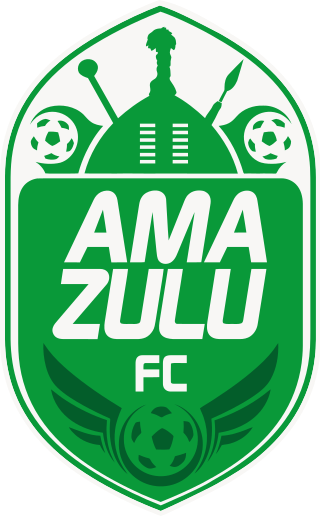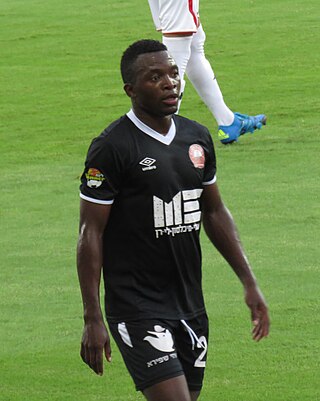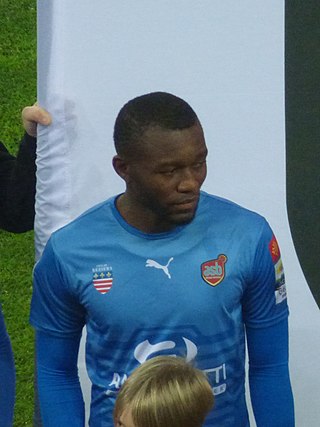Related Research Articles
The Zambia national football team represents Zambia in association football and is governed by the Football Association of Zambia (FAZ). During the 1980s, they were known as the KK 11, after founding president Dr. Kenneth Kaunda ("KK") who ruled Zambia from 1964 to 1991. After the country adopted multiparty politics, the side was nicknamed Chipolopolo which means the "Copper Bullets". The team won an Africa Cup of Nations title in 2012. This team has also become the most successful team in the COSAFA Cup, surpassing Zimbabwe after winning the 2023 edition.

The Ethiopia national football team, nicknamed Walia, after the Walia ibex, represents Ethiopia in men's international football and is controlled by the Ethiopian Football Federation, the governing body for football in Ethiopia. The team has been representing Ethiopia in regional, continental, and international competitions since its founding in 1943. The Walias play their home games at Addis Ababa Stadium located in the capital city of Addis Ababa. They are currently ranked 150th in the world according to the FIFA World Rankings and 44th in CAF.
The Tanzania national football team represents Tanzania in men's international football and is controlled by the Tanzania Football Federation, the governing body for football in Tanzania, Tanzania's home ground is Benjamin Mkapa National Stadium in Dar es Salaam and their head coach is Adel Amrouche from Algeria. They are colloquially known as the Taifa Stars. Tanzania has never qualified for the FIFA World Cup. Before uniting with Zanzibar, the team played as the Tanganyika national football team, The team represents both FIFA and Confederation of African Football (CAF).

The Chad national football team, nicknamed Les Sao, represents Chad in international football and is controlled by the Chadian Football Federation, the governing body for football in the country. The team has never qualified for the World Cup finals or Africa Cup of Nations. Home matches are played at the Idriss Mahamat Ouya Stadium. In April 2021, FIFA banned the Chad national football team from participating in global football over the Chadian government's interference with the Chadian Football Federation.

AmaZulu Football Club is a South African professional soccer club based in the city of Durban in the KwaZulu Natal province, that plays in the Premiership, the first tier of the South African football league system. The club's nickname, Usuthu, is a Zulu war cry.
The Levy Mwanawasa Stadium is a multi-purpose stadium in Ndola, Zambia. It is used mostly for football matches and is the home for ZESCO United. Other Ndola-based clubs like Forest Rangers F.C. and Buildcon F.C. occasionally use the stadium as well. The stadium has a capacity of 49,800 people. It is located on the T3 road at the start of the Ndola-Kitwe Dual Carriageway.
Chaswe Nsofwa was a Zambian international footballer who played as a striker. He died during a training match in Be'er Sheva, Israel.
Kampamba Chintu is a Zambian football defender, he is currently player-manager at Kabwe Warriors. He was a member of the Zambia national team between 1999 and 2012.

Emmanuel Mayuka is a Zambian professional footballer who plays as a striker for the NAPSA Stars and the Zambia national team. He was the top scorer of the 2012 Africa Cup of Nations.

Hervé Jean-Marie Roger Renard is a French professional football coach and former player who is the head coach of Saudi Arabia.

Emmanuel Mbola, is a Zambian professional footballer who plays for Nkana. He is left-footed, and plays primarily at left-back. Between 2008 and 2016, he made 54 appearances for the Zambia national team.
Davies Nkausu is a Zambian professional footballer who played as a defender in South Africa.
Justine Zulu is a Zambian international footballer who plays for Red Arrows, as a midfielder.

The Zambia women's national association football team represents Zambia in association football, participating in qualifying tournaments for the FIFA Women's World Cup and other African-based competitions. It made its debut in the 2023 FIFA Women's World Cup, becoming the first landlocked nation in Africa to qualify for a senior World Cup in either men's or women's soccer.
Freddie Mwila Jr. was a Zambian international footballer.

Emmanuel Shinkut Daniel is a Nigerian football goalkeeper. He represented Nigeria at the 2015 African Games and 2016 Summer Olympics.

Emmanuel Justine Rabby Banda is a Zambian footballer who plays for Al-Tai in Saudi Arabia as a centre midfielder.

Zambian cuisine offers a range of dishes, which primarily features nshima, a staple thick porridge crafted from maize flour, locally known as mealie meal. Nshima itself is quite plain, but it is typically accompanied by an array of traditional Zambian side dishes that introduce a spectrum of flavors to the meal.
References
- ↑ "FIFA Tournaments - Players & Coaches - Emmanuel ZULU". FIFA.com. Archived from the original on 26 October 2012. Retrieved 21 May 2018.
- ↑ "Zulu sacked for drinking". BBC Sport. 2 April 2003.
